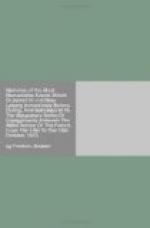CHARACTERISTIC ANECDOTES.
That Napoleon was not quite so much master of himself, during the retreat through Leipzig, as might have been supposed from his countenance, may be inferred from various circumstances. While riding slowly through Peter’s gate he was bathed in sweat, and pursued his way towards the very quarter by which the enemy was advancing. It was not till he had gone a considerable distance that he bethought himself, and immediately turned about. He inquired if there was any cross-road to Borna and Altenburg; and, being answered in the negative, he took the way to the Ranstaedt gate.
* * * * *
None of the French officers or soldiers could be brought to admit that they had sustained any material loss from the Russian arms in 1812; they maintained, on the contrary, that famine and cold alone had destroyed their legions, and that it was impossible for a French army to be beaten. What excuse will they now have to make, when they return, without baggage and artillery, to their countrymen beyond the Rhine?
* * * * *
That the French prophesied nothing good of their retreat the evening before it commenced, is evinced by the circumstance of their having broken up a great number of gun-carriages, and buried the cannon, or thrown them into marshes or ponds. These yet continue to be daily discovered, and that in places contiguous to houses which are fully inhabited. It is rather singular that they were not observed while engaged in this business, which must certainly have been performed with uncommon silence and expedition.
* * * * *
A Russian officer, to whom complaints were made respecting same irregularities committed by the Cossacks in the villages, expressed himself in the following manner in regard to those troops:—“The officers would gladly put a stop to such proceedings, which are strictly prohibited, and severely punished;—but how is it possible for them to have these men continually under their eye? The nature of the warfare in which they are engaged, which obliges them to be constantly making extensive excursions, prevents this. We are often under the necessity of leaving them for several days together to themselves, that they may explore every wood, every corner, and fatigue and harass the enemy. In services on which no other kind of troops can be employed, they are frequently obliged to struggle alone for several days through every species of hardship and danger; and then, indeed, it is no wonder if they occasionally indulge themselves. On account of the important service which they render to the army, we cannot possibly dispense with them. The incessant vigilance of the Cossacks, who are every where at once, renders it extremely difficult for the enemy to reconnoitre, and scarcely possible for him to surprise us; and so much the more frequently are we enabled by them to take him at unawares. In a word, the Cossacks are the eye of the army;—and it is a pity only that it sometimes sees too clearly where it needs not see at all.”




